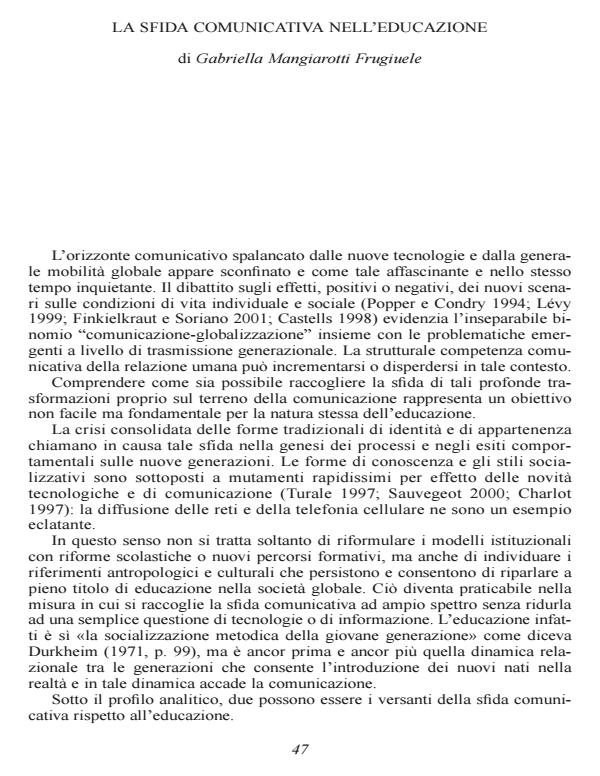La sfida comunicativa nell'educazione
Journal title SOCIOLOGIA DELLA COMUNICAZIONE
Author/s Gabriella Mangiarotti Frugiuele
Publishing Year 2005 Issue 2005/37
Language Italian Pages 9 P. File size 37 KB
DOI
DOI is like a bar code for intellectual property: to have more infomation
click here
Below, you can see the article first page
If you want to buy this article in PDF format, you can do it, following the instructions to buy download credits

FrancoAngeli is member of Publishers International Linking Association, Inc (PILA), a not-for-profit association which run the CrossRef service enabling links to and from online scholarly content.
New technologies and the general global mobility have opened an endless range in communication. This range seems to be attractive and disquieting at the same time. The debate on the effects, positive or negative, of the new scenarios on the individual and social life conditions (Popper 1994, Levy 1999, Finkielkraut 2001, Castells 1998) puts in evidence the inseparable couple communication globalization with the emergent problems that have to do with the generational transmission. The structural communicative competence of the human relationship can increase or disperse in such a contest. Understanding how the challenge of such deep transformations just on the ground of communication can be accepted is an uneasy but basic aim for the nature itself of education. The strong crisis of the traditional forms of identity and belonging involves this challenge in the origin of processes and in the behavioural effects on the new generations. The forms of knowledge and the socializative styles are subjected to very fast changes because of the innovations regarding technologies and communication (Turkle1997, Sauvegeot 2000, Charlot 1997): the diffusion of webs and mobile phones are a clear example of this. In this sense the matter is to reformulate the institutional patterns by school reforms or new formative paths, and to individuate firstly the persistent anthropological and cultural benchmarks that allow to fully deal again with education in the global society. This is possible insofar as the wide-range communicative challenge is accepted without making it a mere matter of technologies or information. Education is the methodical socialization of the young generation as Durkheim said (1971, 99); but it is first of all a relational dynamics among generations that allows the introduction of the newborn people in the reality, and communication takes place in this dynamics.
Gabriella Mangiarotti Frugiuele, La sfida comunicativa nell'educazione in "SOCIOLOGIA DELLA COMUNICAZIONE " 37/2005, pp , DOI: